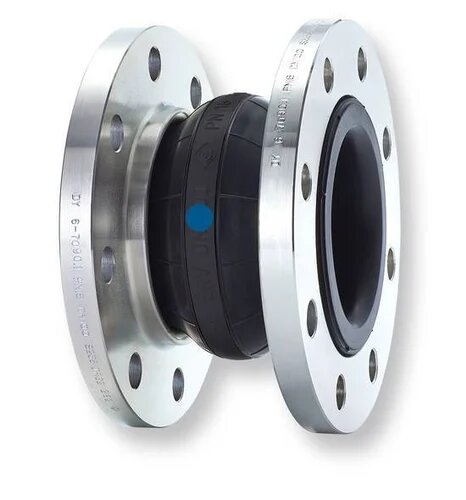
Rubber Expansion Bellow
An expansion joint bellows, often referred to simply as a bellows, is a flexible component designed to accommodate movement, expansion, contraction, or vibration in mechanical systems.
These bellows are typically used in situations where a system requires flexibility while maintaining a tight seal. Expansion joint bellows can be found in various industrial and mechanical applications, and they come in different forms and materials. Here are some key points about expansion joint bellows:
Design and Structure:
- Bellows are constructed as a series of convolutions or folds, which provide flexibility and the ability to elongate or compress.
- They can be made from various materials, including metal, rubber, fabric, and composite materials, depending on the specific application requirements.
Functions of Expansion Joint Bellows:
- Accommodating Movement: Bellows are primarily used to absorb and accommodate various types of movement, such as axial, lateral, angular, or torsional displacement in mechanical systems.
- Sealing: Expansion joint bellows are often employed to create a sealed connection or barrier between components, preventing leaks or the ingress of contaminants.
- Vibration Isolation: They can isolate vibrations and shocks, protecting connected components from damage or excessive stress.
- Pressure Compensation: In some applications, they help balance or equalize pressure differences within a system.
Applications:
- Piping Systems: Bellows are commonly used in industrial piping systems to compensate for thermal expansion and contraction, vibrations, and movement.
- Exhaust Systems: In automotive and industrial exhaust systems, bellows absorb movement and vibration, reducing stress on the system.
- Aerospace: Expansion joint bellows are used in aircraft and spacecraft to allow for thermal expansion and contraction while maintaining a sealed environment.
- Automotive: They can be found in various parts of vehicles, such as the exhaust system and steering components.
- Chemical and Petrochemical Industries: In harsh chemical environments, specialized bellows made from corrosion-resistant materials are used.
Material Selection:
- The choice of material for an expansion joint bellows depends on factors such as temperature, pressure, chemical compatibility, and the specific application requirements.
- Metal bellows are often chosen for high-temperature and high-pressure applications.
- Rubber and elastomeric bellows are used in applications where flexibility and vibration isolation are essential.
- Fabric and composite bellows are preferred for lightweight and flexible applications.
Maintenance and Replacement:
- Regular inspection and maintenance are crucial to ensure that expansion joint bellows continue to function effectively.
- Over time, bellows may wear out or deteriorate due to environmental factors or mechanical stress, requiring replacement to maintain system integrity.
Proper selection, design, and installation of expansion joint bellows are essential to ensure that they perform their intended functions and maintain the integrity of the systems in which they are used. The choice of bellows material and design should be based on the specific needs and conditions of the application.
